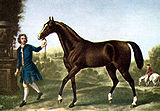456 Adult, Thoroughbred Horses for Sale
showing results 261 - 270 of 456
price: $5,000
OXBOW APINDY with filly by MR Z
OX SEE 2016 unraced by OXBOW G1 winner of the Preakness earning 1.2 million. first dam is USEEWHATIMSAYING by A.P.INDY sister to ATSWHATIMTALKNBOUT G2 winner of 209k 12 sister to G3 winner of 165k ... SEE MORE DETAILS found on Equine NowGilmer, TX, United States
price: $2,500
Velvet Fox
VELVET FOX 2016 unraced by OXBOW G1 winner of the Preakness earning 1.2 million. This young mare was in foal to KEEN ICE had a very good foal that died on fourth day from accident. VELVET FOX first... SEE MORE DETAILS found on Equine NowGilmer, TX, United States
price: $5,000
Oxbow OF aP Indy With Filly by Ransom The Moon
OXS PROSPECT 2016 unraced by OXBOW winner of the G1 Preakness and 1.2 million. first dam is WEEKEND PROSPECT by A P INDY and is a twelve sister to FILM MAKER G1 winner of 2.2 million twelve sister ... SEE MORE DETAILS found on Equine NowGilmer, TX, United States
price: $2,000
Ryder
Ryder is looking for a new job. He does good for the Ferrier and dentist. An extremely level headed horse who can be rode English or Western. Very willing to do what is asked of him. 15.3 hh. Foale... SEE MORE DETAILS found on Equine NowDuncannon, PA, United States
price: $5,000
Producer of 100k Winner IF to Bal a Bali
MISTY NORTH 2010 bay mare by NORTH LIGHT G1 winner of two million she is a winner and her 2016 foal has seven wins in 2019 and has earned almost 100k has a 2017 by ENGLISH CHANNEL that is in traini... SEE MORE DETAILS found on Equine NowGilmer, TX, United States
price: $9,500
OTTB packer with Lease Option
Jumping to Conclusions Jerry Jerry is an OTTB thoroughbred in the incentive fund. He is a super easy keeper and goes anywhere. Trailers alone or with others. He has shown competitively at CFHJA Cam... SEE MORE DETAILS found on Equine NowLakeland, FL, United States
price: $9,000
Manhattan Sweet Jumper with lots of Potential
My daughter is headed off to college and Mana needs a home that will keep him busy. Mana is an OTTT Shaggy McPhee who has trained in dressage and jumpers. Mana is extremely brave and will jump anyt... SEE MORE DETAILS found on Equine NowMagnolia, TX, United States
price: $4,500
Available Now Honest TB Jumper for Sale Secret
PLEASE SEE WEB SITEFOR VIDEOS AND DETAILED INFORMATION!! www.TellMeYourSecrets.US 2004 16 hand Bay Thoroughbred Gelding Sea of Secrets X Pila X Polish Numbers Secretariat and Seattle Slew in lineag... SEE MORE DETAILS found on Equine NowLand O Lakes, FL, United States
price: $5,000
RRP Elligible 2014 Mare
Secret Brass aka Ellie is a 16.1h 5 yr old thoroughbred mare who last raced August of 2019. She is RRP elligible and ready to be restarted. She has had 3 mons off and is a clean slate retired sound... SEE MORE DETAILS found on Equine NowSummerfield, FL, United States
price: $9,000
13yo chestnut TB gelding for sale
13yo chestnut TB gelding for sale. 16.1hh. Mowgli has competed through Training level eventing schooled through preliminary and has recently gotten into fox huntingand LOVES it!. This would be a go... SEE MORE DETAILS found on Equine NowMebane, NC, United States
Sale by Discipline
- 4Breeding
- 1Brood Mare
- 7Dressage
- 4Eventing
- 13Hunter
- 14Jumper
- 1Lesson Horse
- 1Polo
- 1Racing
Sale by Sex
Sale by Age
Sale by Size
Sale by Color
More information on Thoroughbred


The Thoroughbred is a horse breed best known for its use in horse racing. Although the word thoroughbred is sometimes used to refer to any breed of purebred horse, it technically refers only to the Thoroughbred breed. Thoroughbreds are considered "hot-blooded" horses, known for their agility, speed and spirit.
The Thoroughbred as it is known today was developed in 17th and 18th-century England, when native mares were crossbred with imported Oriental stallions of Arabian, Barb, and Turkoman breeding. All modern Thoroughbreds can trace their pedigrees to three stallions originally imported into England in the 17th century and 18th century, and to a larger number of foundation mares of mostly English breeding. During the 18th and 19th centuries, the Thoroughbred breed spread throughout the world; they were imported into North America starting in 1730 and into Australia, Europe, Japan and South America during the 19th century. Millions of Thoroughbreds exist today, and more than 118,000 foals are registered each year worldwide.
Thoroughbreds are used mainly for racing, but are also bred for other riding disciplines such as show jumping, combined training, dressage, polo, and fox hunting. They are also commonly crossbred to create new breeds or to improve existing ones, and have been influential in the creation of the Quarter Horse, Standardbred, Anglo-Arabian, and various warmblood breeds.
Thoroughbred racehorses perform with maximum exertion, which has resulted in high accident rates and health problems such as bleeding from the lungs, low fertility, abnormally small hearts and a small hoof to body mass ratio. There are several theories for the reasons behind the prevalence of accidents and health problems in the Thoroughbred breed, and research continues.
read more on WikipediaThoroughbred Prices
Thoroughbred Listings Count